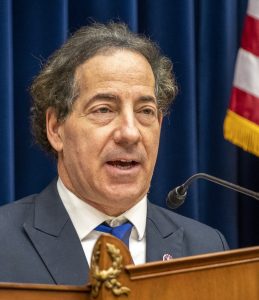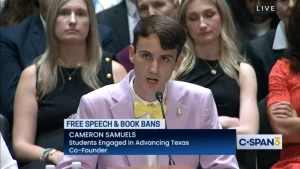People of faith must stand up against the proliferation of book-banning campaigns or face the inevitable erosion of religious liberties, according to library and reading advocate Tracie Hall.
“This is a moment we cannot take lying down. We cannot have freedom of religion without freedom of speech,” she said during an Interfaith Alliance briefing from Capitol Hill. “We cannot have freedom of religion without defending the right to read.”

Tracie D. Hall
Hall, who stepped down last month as executive director of the American Library Association, was one of three panelists hosted by Interfaith Alliance to discuss the connection between censorship and basic American freedoms, including the right to worship, assemble and read religious and other literature. The Capitol Hill venue was reserved by U.S. Rep. Jamie Raskin, D-Md., who spoke in part about having his own book banned in Texas last year.
Moderator and Interfaith Alliance President Paul Raushenbush said the panel discussion was intended to motivate congregations and individuals of faith to advocate for libraries and public schools where conservative interest groups have focused efforts to ban books they consider religiously or socially offensive.
“This event is one example of how we mobilize powerful coalitions to challenge Christian extremism and religious extremism and partner with government officials to advocate for a more equitable and just America where freedom of belief and religious practice are protected, and where all persons are treated with dignity and have the opportunity to thrive,” Raushenbush said.
Book banning is a democracy and faith issue because many bans across the country have targeted texts with religious themes and characters representative of non-Christian traditions, he explained. “Just this last year, there were 41 instances of book bans targeting books centering on Jewish characters and 57 instances of books being banned that center Muslim characters.”
The free-speech and human-rights group PEN America said it has tracked 6,000 instances of banned books since 2021, including 3,362 bans of 1,557 titles during the current school year. Florida passed Texas this year in having the most books taken off of shelves, the group said.
Special interest groups led by Moms for Liberty, Citizens Defending Freedom, and Parents’ Rights in Education, organized bans in 153 school districts during the 2022-2023 school year, PEN America said.
“We’re in a precarious moment in our country, and banning books is the opposite direction of where we need to go.”
The result, Raushenbush said, is that Americans lose the opportunity to learn about the beliefs and humanity of others. “We’re in a precarious moment in our country, and banning books is the opposite direction of where we need to go.”
Minority religions aren’t the only target of conservative book bans, he added. “Faith is being used as an excuse to censor materials with LGBTQ subject matter. It is critical that people of faith recognize this threat and take action.”

Jamie Rashkin
Raskin called for activism against more than just book bans. “The censorship of books, censorship of curriculum, censorship of teachers, censorship of ideas and free speech and free discourse are always an exercise of power and they are nothing that leads to the moral or spiritual improvement of society.”
Members of Congress have a responsibility to act, he said. “We need more politicians reading books and fewer politicians banning books.”
Raskin shared the experience of seeing his 2008 book, We the Students: Supreme Court Cases For and About Students, banned in Texas in 2022. The book covered cases involving locker searches, drug testing, segregation, desegregation and censorship in middle and high schools.
“It coincided just accidentally with the same week that (Russian President) Vladimir Putin banned me for life from ever going to Russia for my pro-Ukraine activities,” he said.
Books and articles about other faith, ethnic and gender identities are important because they present alternative worldviews and perspectives about the complexity of faith and culture, Raskin added. “And all of that is extinguished and flattened out by censorship.”
Sikhs in the U.S. know all too well the dangers associated with lack of knowledge about other religious groups, said Anisha Singh, executive director of the Sikh Coalition.

Anisha Singh
According to a coalition fact sheet, more than 300 acts of violence and discrimination against Sikhs were reported in the first month after 9-11, with thousands more since the terror attacks. Many Americans confuse Sikhs with Muslims.
“One of the things we say often at the Sikh Coalition is, ‘Ignorance fuels animosity,’ and that’s true today when you see this heightened anxiety and this heightened ignorance, this fear that is being perpetrated and spread when there’s a conversation about banning books that can really grow our knowledge.”
An important tool in countering bigotry is working proactively to educate students, which includes raising them to read books to understand different people and faiths, she said.
“We truly do believe there is a direct correlation between allowing individuals — especially young kids — to have access to the knowledge to really understand who communities are, how we came into this country, how we live, how we contribute to society and … bringing down some of these statistics that we’re seeing.”
Book bans are tactics used by special interest groups to wield control over the definition of status quo in America, said Cameron Samuels, executive director of Students Engaged in Advancing Texas.
“Right now, that status quo is one that is very restricted, that is keeping many people marginalized because of identity, because of faith, because of these inherent characteristics that we have as humans that certain people just simply disagree with,” said Samuels, a Jewish and nonbinary college student who testified on book banning before the U.S. Senate Judiciary Committee in September. In 2022, he led a successful campaign to lift a Houston-area school district’s ban on access to LGBTQ websites.

Cameron Samuels
“As someone of Jewish faith, I am very compelled to pursue justice where it matters, to show up where these decisions are being made because if I am not doing it, then who will? That is our belief as Jewish people: If not us, then who?”
Hall said communities and individuals of faith can do much to resist these bans, including speaking out against censorship as a violation of human and constitutional rights. “Support any place where books are being banned. Support your schools and public libraries. Schools are really under attack.”
She also suggested everyone read more books, including those that have been taken from shelves. “I would say to the faith community: Don’t sit this conversation out because this is a conversation that is using censorship as a Trojan horse for other planned encumbrances and circumscriptions of foundational human rights.”


